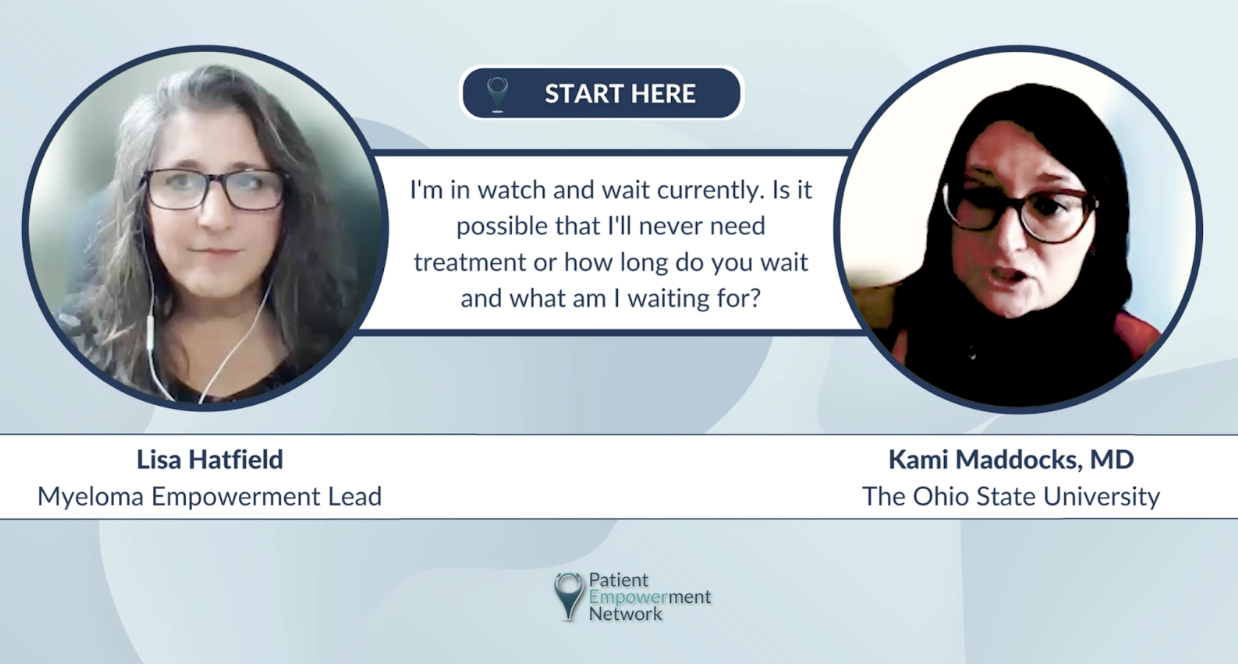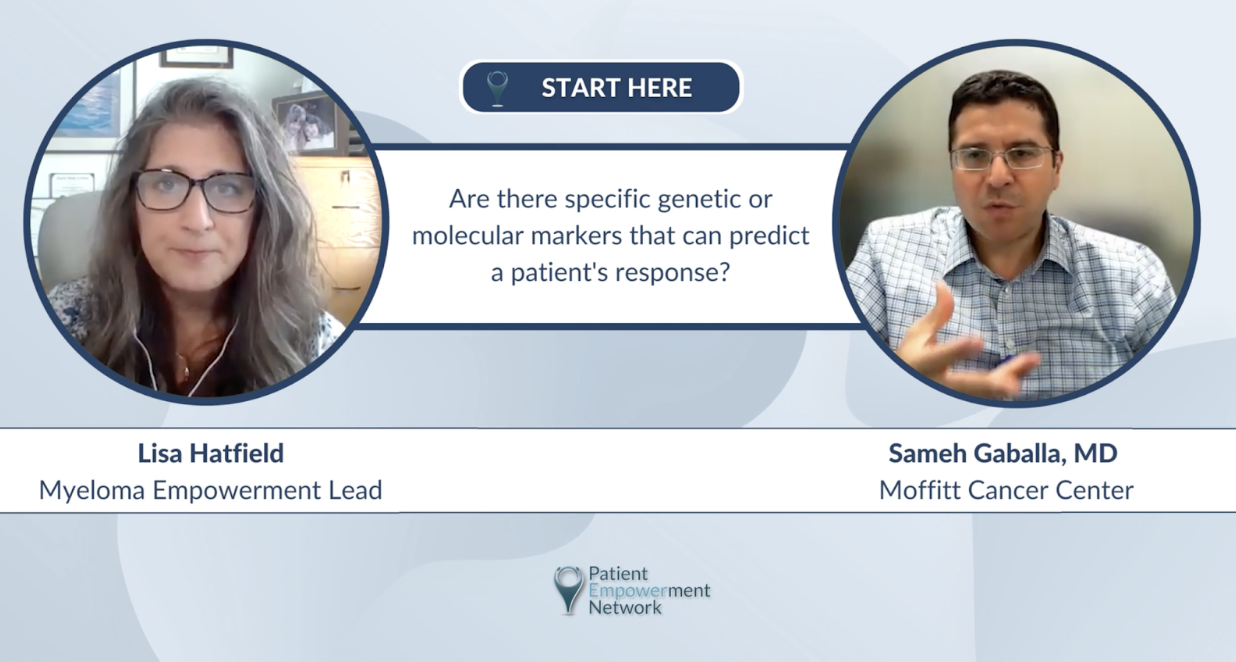START HERE: Bridging the Follicular Lymphoma Expert and Patient Voice
Follicular lymphoma can sometimes feel overwhelming and complicated, but what can patients and care partners do to help improve their care? With this question in mind, the Patient Empowerment Network initiated the START HERE Follicular Lymphoma program, which aims to close the gap in the expert and patient voice to build empowerment.
START HERE Follicular Lymphoma Program Resources
The program series includes the following resources:
- START HERE Patient-Expert Q&A Webinar with expert Dr. Sameh Gaballa moderated by a cancer patient
- START HERE Library of resources has kicked off with a resource guide filled with a newly diagnosed checklist, diagnostic tests, glossary of terms, follicular lymphoma educational and support resources, along with expert tips
- Your START HERE 90-Day Plan personalized 90-day patient plan with resources from trusted advocacy partners
- START HERE Activity Guide a downloadable, printable support resource packed with information and activities to educate, empower, and support follicular lymphoma patients and care partners in their journeys through care
- START HERE Resources of PEN text alerts to receive personalized support from PEN Empowerment Leads, blogs, and downloadable guides
Patient-Expert Q&A Webinar Topics and Key Takeaways
In the Patient-Expert Q&A webinars, follicular lymphoma experts Dr. Sameh Gaballa from Moffitt Cancer Institute and Dr. Kami Maddocks from Ohio State University Wexner Medical Center shared their expert knowledge to help patients and care partners fortify their knowledge and confidence. Cancer patients and Empowerment Lead Lisa Hatfield moderated the discussions and shared some of her perspectives as a patient. The follicular lymphoma experts and cancer patient provided some in-depth discussion along with key takeaways. Some of the discussion covered:
- Follicular Patient-Expert Q&A
- What Exactly is Follicular Lymphoma? An Expert Explains
- What Follicular Lymphoma Treatments Are Available?
- Newly Diagnosed With Follicular Lymphoma? Start Here
- Understanding Follicular Lymphoma Disease Progression Symptoms and Monitoring
- How Can Follicular Lymphoma Treatment Side Effects Be Reduced?
- Relapsed/Refractory Follicular Lymphoma Treatments and Bispecific Antibodies
- Follicular Lymphoma Disease Transformation and Secondary Cancer Risk
- START HERE Follicular Lymphoma Resource Guide
- START HERE Follicular Lymphoma Resource Guide en Español
- START Here Follicular Lymphoma Resource Guide 2
- START HERE Follicular Lymphoma Resource Guide 2 en Español

The concept of watch and wait is a key point that was covered in the webinar. Dr. Gaballa shared how he explains watch and wait to patients. “But then when you explain to them, “Well, you see, you don’t have a lot of disease, those studies have already been done in the past where patients who were treated or not treated, the survival was the same, so there, you might get side effects from the treatment, but not necessarily have benefits. And in the future, should this need to be treated, we have a lot of things to do.””
The main predictor of follicular lymphoma prognosis is called POD24. Dr. Gaballa explained the significance of this. “Unfortunately, the best predictor of prognosis for follicular lymphoma, you would know about retrospectively, it’s something called POD24, progression of disease in 24 months. Meaning that if you have a patient who’s treated with chemotherapy and immunotherapy, and then they go into remission, and then they relapse again in less than 24 months, progression of disease within 24 months, those are the, those represent about 20 percent of follicular lymphoma patients, and those represent a high-risk group of patients.”

Follicular lymphoma patients should try to remain aware of symptoms of disease progression or transformation. Dr. Gaballa discussed some symptoms to be on the lookout for. “…So like the sweats, the fevers, the weight, loss of weight, loss of appetite, these are also sometimes things to look out for. Not necessarily, they don’t always mean that it’s transformed disease. It can also be that the follicular lymphoma is also progressing and might need to be treated as well.”
Lymph node involvement should be monitored as well. Dr. Gaballa explained, “…if you notice a lymph node that in your neck or under the armpits or the groin areas, if they’re growing, then that needs to be evaluated. I mean the patients should expect that those will be growing, they will grow. But they grow over months and years. They don’t grow over weeks.”
Follicular lymphoma clinical trials continue to bring exciting opportunities with potential improved treatments with a future that looks hopeful. Dr. Maddocks shared an update about a possible trial for bispecific antibodies. “…we’re also looking at opening a trial for frontline follicular lymphoma that looks at the use of bispecific antibodies. So I think that’s very exciting, because in general, it’s a well-tolerated therapy. And I think if it gives us a chance to produce very good outcomes, but without the toxicity of chemotherapy in the frontline setting, that to me is super exciting for patients. We’re also looking at different bispecific antibodies. So they currently approved one target CD20. We have a CD19-targeted bispecific antibody that I also think is exciting to look at the potential for different targets because then once a patient has had one, you’re targeting something different, and the thought is that they might still be able to respond to a different one.”
It’s important for patients to share about their symptoms during watch and wait. Dr. Maddocks explained her perspective about patient communication. “So we have a 24-hour triage line. I recommend that if patients have a question or concern, it’s better to ask us because if we don’t know about it, we can’t help is the first thing…I think people should always call with any signs, symptoms, concerns, and then it can be addressed.”
Some blood cancer patients may be surprised to learn about the potential for skin vulnerability with some cancer treatments. Dr. Maddocks discussed guarding against secondary cancers and increased vulnerabilities. “I think patients definitely should be wearing sunblock, because we know that a lot of patients with blood cancers can get secondary malignancies. So being careful of being…we also know, I should say, even patients who are getting treated can have a more sensitivity to the sun. So being careful with sun precautions, either avoiding the sun or wearing sunblock, making sure you’re covered when you go outside. I’ll even say I’ve seen a few patients who during treatment have gotten bad windburns. So your skin definitely can be more sensitive when you’re receiving therapies.”
Some program participants provided valuable testimonials about the START HERE Follicular Lymphoma Patient-Expert Q&A webinars.
- “I fully understand the potential for transformation and early recurrence, but it was wonderful to hear the hopeful and positive tone of this webinar. Thank you!”
- “I appreciated that he mentioned that the science behind FL treatment is continuing to evolve at a rapid place.”
- “Much better comprehensive understanding of my disease, hopefulness for the future, and a better knowledge base to ask questions and advocate for myself.“
- “Things were explained simply and thoroughly. And I like the 30-minute format. Great presentation. I look forward to more.”
- “This was a great program, I learned so much. The fact that FL has many treatments in the pipeline. The doctor is an excellent communicator.”
Many other questions were raised during the Follicular Lymphoma Patient-Expert Q&A webinars. We hope you can use these valuable follicular lymphoma resources to build your knowledge and confidence toward becoming a more empowered patient or care partner.



